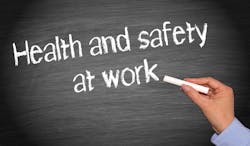NFPA 70E: Electrical Safety Training Requirements — Part 2
Sometimes, a qualified person needs additional training or retraining in some aspect of electrical safety. How does a supervisor determine when that is? How does the qualified person determine when that is? NFPA 70E provides five criteria in 110.6(A)(3). If any one of the five is true, then additional training or retraining must be provided to the qualified person in question.
These are:
- The employee is not complying with the safety-related work practices. This might indicate a need for training, perhaps previous training was inadequate. But perhaps the employee’s attitude is inadequate. Don’t apply training to fix an attitude problem, and don’t apply formal discipline to fix a training problem. Figure out what the problem is.
- You have new techniques, new equipment, procedure changes, etc. Any time there’s a change like this, proceed under the assumption that the training for the old techniques, equipment, procedures, etc., is not going to cut it. Determine what the new safety parameters are and then what training is needed to address them.
- The employee performs this task less than once per year. A refresher session will usually suffice.
- These particular safety-related work practices are not normally used by this employee during regular job duties. A review with someone who normally does perform them will usually suffice. If no such person is available, then some other sort of review will be necessary.
- The employee’s job duties change. The employee will require safety training relevant to the new duties.
Safety training can be a classroom, on the job, or a combination of the two. Assess the risk to the employee to determine the type and extent of the training that should be provided [110.6(A)(4)].
About the Author

Mark Lamendola
Mark is an expert in maintenance management, having racked up an impressive track record during his time working in the field. He also has extensive knowledge of, and practical expertise with, the National Electrical Code (NEC). Through his consulting business, he provides articles and training materials on electrical topics, specializing in making difficult subjects easy to understand and focusing on the practical aspects of electrical work.
Prior to starting his own business, Mark served as the Technical Editor on EC&M for six years, worked three years in nuclear maintenance, six years as a contract project engineer/project manager, three years as a systems engineer, and three years in plant maintenance management.
Mark earned an AAS degree from Rock Valley College, a BSEET from Columbia Pacific University, and an MBA from Lake Erie College. He’s also completed several related certifications over the years and even was formerly licensed as a Master Electrician. He is a Senior Member of the IEEE and past Chairman of the Kansas City Chapters of both the IEEE and the IEEE Computer Society. Mark also served as the program director for, a board member of, and webmaster of, the Midwest Chapter of the 7x24 Exchange. He has also held memberships with the following organizations: NETA, NFPA, International Association of Webmasters, and Institute of Certified Professional Managers.
